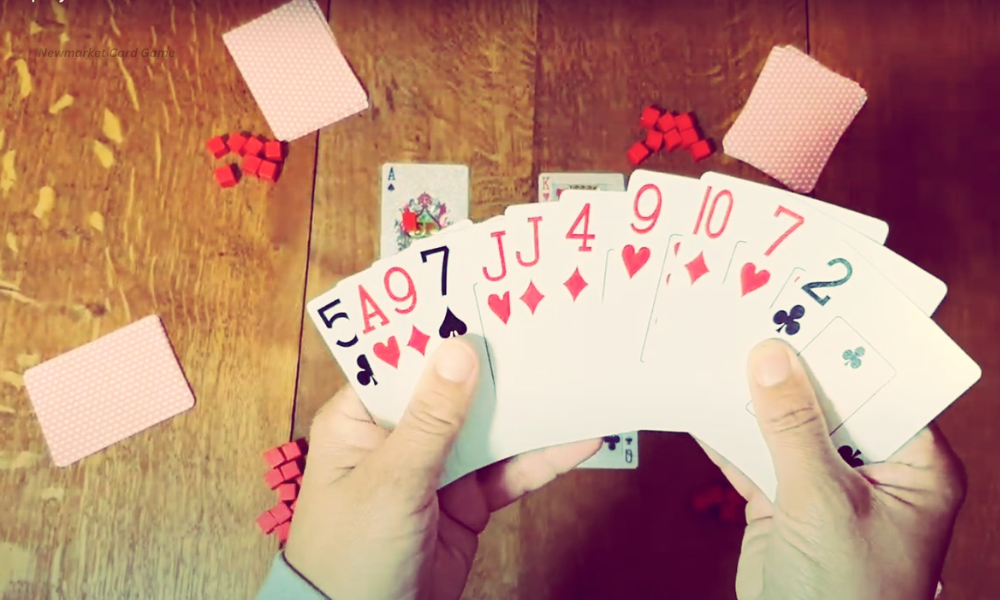Newmarket Card Game: The Ultimate Guide to Playing, Rules, and Winning Tips

Newmarket Card Game
The Newmarket card game is a classic British gambling game that has entertained families for centuries. If you’re looking for a lighthearted mix of chance and strategy, Newmarket is the perfect choice. Players enjoy the fast-paced betting style, while still requiring just enough skill to keep things interesting. You don’t need to be a professional card shark to jump in and have a great time. This guide will walk you through every aspect of the game so you can master it with confidence.
Objective of Newmarket
The main goal in Newmarket is to win chips by playing sequences of cards in a race-like fashion and by capturing stakes cards. Each player wants to be the first to play out all their cards while collecting chips from the stakes and other players. It’s a race – not just of speed, but of timing and observation. This simple objective makes the game accessible even to beginners, while still being engaging for seasoned players.
History and Origins of Newmarket
Newmarket is believed to have originated in the 18th century in England, named after the famous horse racing town “Newmarket.” Its style mimics horse racing, with the “stakes cards” representing different horses. It evolved from older gambling games like Pope Joan and Commerce. Over time, Newmarket became a favorite in households and parlors, especially during Victorian times. It bridged generations by being suitable for both children and adults, combining luck, interaction, and mild gambling for entertainment.
Equipment Needed to Play
You don’t need much to get started with Newmarket – just a few simple items that you likely already have at home.
Standard Card Deck
A standard 52-card deck is used. In some versions, an extra set of four cards called the “stops” or stakes cards are removed and placed separately. Make sure to remove jokers.
Newmarket Layout and Chips
You’ll also need a handful of chips (or coins, buttons, or tokens) to use for betting. Players agree on the value of each chip. The table layout should have designated areas for placing the four stakes cards and chips.
Number of Players and Game Duration
Newmarket works best with 4 to 6 players. It can be played with 3, but fewer players slightly reduce the excitement. The average round takes about 15–20 minutes, but players often keep going for hours due to its addictive nature. It’s fast, lively, and doesn’t drag on like some longer card games.
Game Setup: How to Start
Each player antes up a small number of chips into each stakes pot (typically 1 chip per card). Then, four specific cards from a different suit each (like the Ace of Spades, King of Hearts, Queen of Clubs, and Jack of Diamonds) are placed face-up on the table. These become your stakes cards. Shuffle the remaining deck and deal all cards evenly among players. If any cards are left over, set them aside face down.
Understanding the Stakes Cards
What Are Stakes Cards?
Stakes cards are the heart of Newmarket. These are the four specific cards placed in the center at the beginning of each game. If a player plays a card that matches a stakes card during the round, they win the chips in that corresponding pot.
Placement and Use
Each stakes card should have its own pot. Players put chips into each pot at the start, and whenever someone wins chips from a pot, that card gets replaced with a new one for the next round. Stakes cards change the rhythm of the game, making every hand unpredictable.
Dealing the Cards
After the stakes are in place, the dealer shuffles and distributes all remaining cards to players clockwise. If you end up with an extra card or two, just remove them. Each player should have as equal a number of cards as possible. Players don’t rearrange their hands, and there’s no card swapping like in poker or rummy.
How to Play Newmarket – Turn by Turn
The player with the lowest club (usually 7♣ or 2♣, depending on house rules) begins. They place it face-up, and then players continue placing the next higher card in the same suit. This continues until someone cannot play, at which point the turn passes to the player who can play the lowest card of a different suit. When a player plays a card that matches a stakes card, they win that pot. The first player to run out of cards ends the round.
Rules of the Game
- Always follow suit and ascending order.
- When you can’t play a higher card, you stop, and the next suit starts.
- You win a pot by playing a card matching a stakes card.
- First player to use all cards ends the round.
- Leftover cards don’t win any rewards.
- If no one plays a stakes card during a round, those pots carry over.
These simple rules keep the gameplay straightforward and fun for all ages.
How to Win Newmarket
Winning isn’t just about getting rid of your cards fast — it’s about timing your plays to maximize chip wins. You win by collecting the most chips through playing stakes cards and finishing your hand first. It’s like balancing on a tightrope: speed matters, but so does strategy. Don’t just play randomly — think ahead.
Strategy and Tips to Win More Often
Pay Attention to Cards Played
Watch what suits and values have already been played. If you track which cards are out, you can better predict what’s coming up and when to switch suits.
Manage Your Chips Smartly
Don’t blow all your chips early. The real winners in Newmarket are those who consistently collect chips while avoiding unnecessary bets. It’s tempting to bet big, but patience pays in the long run.
Variations of Newmarket
The beauty of the Newmarket card game lies in its flexibility. While the core gameplay remains consistent, there are several popular variations that give the game a fresh twist and keep players engaged.
Modern House Rules
Many households like to spice up Newmarket with their own rules. For example, some versions use jokers as wild cards or add extra stakes cards for more betting opportunities. Others modify how chips are collected — perhaps awarding bonus chips to the round winner or adding penalty chips for players who still have cards left at the end.
Some house rules introduce “double stakes” rounds where all chip values are doubled. This adds a thrilling risk-and-reward element that shakes things up.
Regional Twists
In different regions, Newmarket may go by other names like “Michigan” or “Stops.” Each region has minor differences in card dealing, stakes card selections, or even how sequences are played. In some versions, stakes cards can include the Joker or even change every round based on the first card played.
It’s fun to experiment with these twists, especially if you’re playing with a group that enjoys adapting the rules for a unique experience.
Common Mistakes to Avoid
Even seasoned players can trip up in Newmarket. Here are some blunders you should watch out for:
- Forgetting to ante: Every round starts with each player adding chips to the stakes cards. Skipping this ruins the stakes pot.
- Playing out of turn: Players must only play when it’s their rightful turn based on the sequence.
- Not paying attention to suits: It’s easy to mistakenly play a wrong-suit card if you’re not focused. That invalid move could forfeit your turn.
- Misidentifying stakes cards: Be sure you know which cards are stakes for the round — playing a near match doesn’t count.
- Spending all chips too quickly: Without enough chips, you can’t ante or play — effectively putting you out of action.
- Neglecting card tracking: Knowing what’s been played gives you a huge advantage — don’t ignore it.
- Being too predictable: Mix up your play style to avoid giving away patterns.
- Overlooking rule changes in house variants: When playing different versions, clarify the rules beforehand to avoid confusion.
Avoiding these errors keeps the gameplay smooth, fair, and fun for everyone.
Why Newmarket Remains Popular
So, why has Newmarket stood the test of time? It’s simple: it’s a game that blends excitement, strategy, and just enough luck to make everyone feel like they have a shot at winning. Whether you’re a teenager learning your first card game or a grandparent teaching the next generation, Newmarket brings people together. Its simplicity, speed, and versatility make it a top pick for game nights, family gatherings, and casual betting fun.
Moreover, Newmarket doesn’t require expensive equipment or steep learning curves. That’s rare in a game that offers this much entertainment. It has a timeless charm, which is why it’s still played centuries after its origin.
Conclusion
The Newmarket card game offers an incredible blend of luck, strategy, and interaction that few card games can match. Whether you’re a beginner wanting a game that’s easy to pick up or a seasoned card player looking for something engaging yet light-hearted, Newmarket ticks all the boxes. With a standard deck, some chips, and a little competitive spirit, you’ll be hooked in no time. Use the strategies in this guide, avoid the common pitfalls, and most importantly—have fun. The more you play, the better you get, and the more enjoyable each game becomes. Give Newmarket a shot, and you’ll see why it’s still a fan favorite across generations.
FAQs
What do you need to play the Newmarket card game?
You need a standard 52-card deck (without jokers), 4 designated stakes cards, and a supply of chips for betting. A flat surface and 3–6 players are ideal for gameplay.
Is Newmarket the same as Michigan Rummy?
Not exactly. While they are closely related and share some mechanics, Michigan Rummy includes a poker-style betting phase and a game board. Newmarket is simpler and focuses more on card sequencing and stakes.
Can children play Newmarket?
Yes, the game is family-friendly, especially if you substitute chips with tokens or small treats. Just make sure the betting aspect is age-appropriate.
How long does a game of Newmarket take?
A typical round lasts around 15–20 minutes, but most players play several rounds in a session. It’s fast-paced and addictive, making it great for game nights.
What happens if no one plays a stakes card?
If no one plays a matching stakes card during the round, the chips in those pots carry over to the next round, making the stakes even more exciting.


![Best Mouse for Gaming: Top Picks, Features & Buying Guide [2025] 3 Best Mouse for Gaming](https://digiversemagazine.co.uk/wp-content/uploads/2025/05/Best-Mouse-for-Gaming-768x576.webp)



